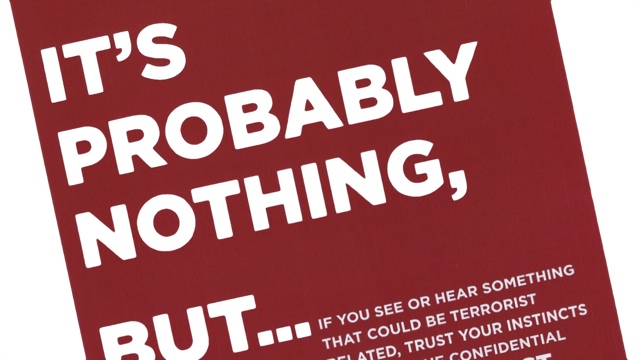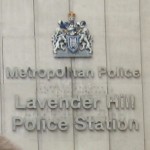
Thanks to the leaflet the Met popped through my door the other day I know exactly what to look out for to prevent terrorism.
I’m reassured that I’m playing my part, looking out for people who have “bought or hired a vehicle in suspicious circumstances.” or who hold “passports or other documents in different names for no obvious reason” (my emphasis), you know, the sort of things you wouldn’t have thought in any way odd before the leaflet (or this blog post) told you.

While not quite as bad as the 2009 campaign which wanted you to shop your neighbour if they were doing too much washing up it still seems based on the idea that you should automatically fear something that’s outside your normal range of experience.
My problem with these annual campaigns is two-fold.
First, they are useless. “It’s probably nothing, but…” is more an invitation to report anything, than it is practical advice to a community. It is so vague and generic as to be useless. Should I fear my neighbour, because he has fertiliser and a large vehicle? Or should I see if his gardening business could give my back-yard a quick once over? If the Met were serious, they’d be looking at far more practical advice tailored to the community.
Second, the biggest impact of this leaflet is to spread fear and uncertainty. We can ‘defeat terrorism’, we are told, but it doesn’t really put the problem into a context. Terrorist attacks are gruesome, high-profile and incredibly emotive, but looked at objectively represent a miniscule fraction of human activity. As Dan Gardner pointed out over a year ago, terrorism in Europe has been declining, and most terrorism aims to further specific nationalist issues (mainly Basque separatism).
What is particularly telling is that the decline is not just in terrorist attacks, but in failed and foiled plots as well. In other words, there aren’t just fewer terrorist incidents in Europe, there are fewer attempted terrorist incidents too.
Of course, you might argue that by creating a climate of fear and suspicion terrorists are unable to operate. I’m not sure I want to live in a society where the majority live in constant fear and suspicion of a small (but exaggerated) minority who would kill them.
According to the Global Terrorist Database there were just four terrorism-related fatalities in Western Europe in 2010, three in Greece and one in Sweden. When you compare it to around 700 smoking-related deaths per year in Wandsworth alone you have to wonder why we are so keen to create fear of terrorism.
 I have tended to shy away from national politics and issues in this blog, keeping it more focused on local and council issues. However, one subject that increasingly concerns me is the erosion of civil liberties in this country. Yesterday saw another little chunk of our freedoms eroded with
I have tended to shy away from national politics and issues in this blog, keeping it more focused on local and council issues. However, one subject that increasingly concerns me is the erosion of civil liberties in this country. Yesterday saw another little chunk of our freedoms eroded with